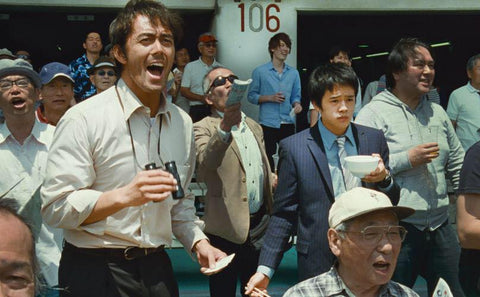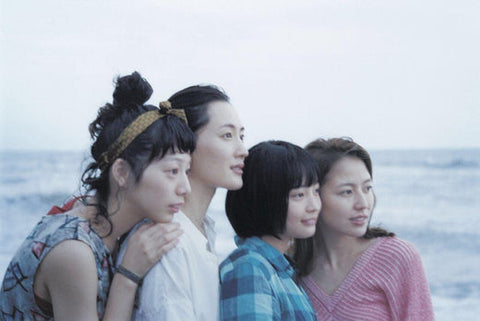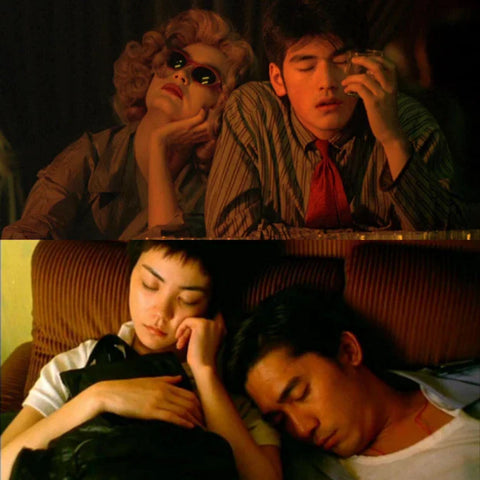
Due to my own experiences growing up, After the Storm resonates with me on a deeply personal level. Compared to Hirokazu Koreeda’s other works, like Still Walking or Our Little Sister, this film contains fewer picturesque scenes and culinary details. Its narrative is quiet, almost uneventful. But in its subtleties, it captures the complex, bittersweet dynamics of a family shaped by gambling—something I understand all too well as the daughter of a gambler.
There are fragments of my childhood I can never forget. I remember one day when my father suddenly gave me a battery-operated toy rabbit. As I hugged it tightly, he announced that he’d be leaving home for a few days. The moment the door shut behind him, I cried inconsolably. For some reason, I thought he was gravely ill—perhaps I’d watched too many melodramatic TV shows.
Sometimes, he wore a gold chain and ring, and he’d buy my mother expensive jewellery. But soon enough, my mother would wait until she thought I was asleep to ask him, quietly but firmly, where her jewellery had gone. By then, his gold accessories would have disappeared as well. By secondary school, I had a bit of pocket money, and I recall my father borrowing it—or simply taking it—on more than one occasion. It was around then that I began to understand: my father was a gambler.
Perhaps that’s why the film hit so close to home. The father’s tender yet powerless love for his son, the mother’s enduring affection for her husband despite knowing she must stand firm against his irredeemable flaws, the grandmother’s quiet frustration at her son’s squandered potential, and the child’s bewilderment at the compromises and tensions of adulthood—these emotions were all so painfully familiar. As a child, I could only view these struggles from the son’s perspective, but as I grew older, I began to see the broader picture.
My father was a kind and generous man. He cared deeply for his parents and was my grandmother’s favourite among her ten children. Yet he avoided visiting her too often, afraid of her disappointment. He once told me, “Your grandparents are devout Christians, but I smoke, drink, and gamble. I don’t want to shame them.”
At work, he was diligent and well-liked by his colleagues, whom he treated like brothers. He cared about them more than anyone else, perhaps because he had so few close friends of his own. But his loyalty to his “brothers” often placed an even greater strain on our family.
There’s a scene in the film where the father secretly counts the money in his wallet before handing over a portion to his wife. In front of his son, he feigns confidence, while at work, he pours his energy into mentoring younger colleagues. Watching it, I was overwhelmed by memories of my own father. Hiroshi Abe plays these flawed, struggling men so naturally, evoking both laughter and tears. As the audience around me chuckled, I found myself crying instead.
When I was younger, I resented my parents for not loving each other. This film, in its quiet way, helped me let go of that resentment. It made me realise that, in the adult world, love is important, but so is survival. Without bread, there’d be no way for me to have grown up at all.
The film also filled a void in me. Through its layered depiction of family, I saw that while people may appear isolated, they remain deeply connected. The fractured state of these relationships, as painful as it seems, is often sustained for the sake of the children.
"We can’t become the adults we dreamed of being." My father never became the “good man” others expected him to be, though I still take pride in his kindness. My mother never became the picture-perfect “happy wife.” My grandmother never got to enjoy the comfort of her children’s success. Life is full of these quiet disappointments.
Growing up, I never had grand ambitions. I just wanted a good job so I could renovate my grandmother’s old house and make my father proud. But by the time I’d secured that job, almost everyone I’d wanted to share the news with was gone. How could I not feel helpless?
The greatest helplessness came from reading a scathing review of the film by a critic who dismissed it as “pretentious and dull.” But perhaps it’s a good thing she didn’t understand it. It means she never had to live through these contradictions herself. Still, her critique annoyed me—some feelings don’t require firsthand experience to comprehend. To label something “pretentious” simply because you dislike it is, ironically, the height of pretension.
Let me share a song that feels like home: It’s My Sea by Sodagreen.
"If time keeps flowing so fast,
how can I depend on you?"
I still believe that a love deeper than the sea, does exist.


